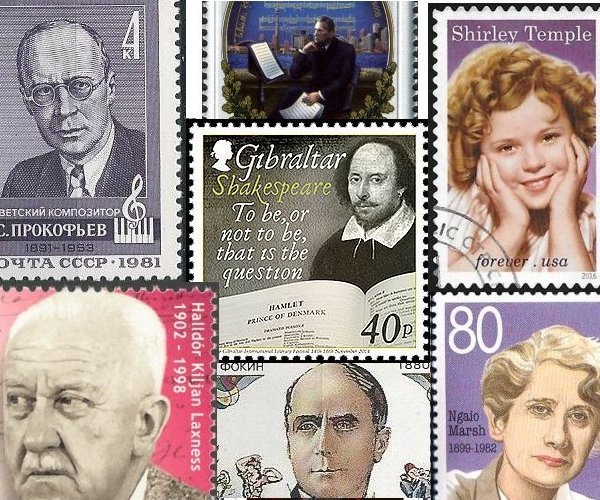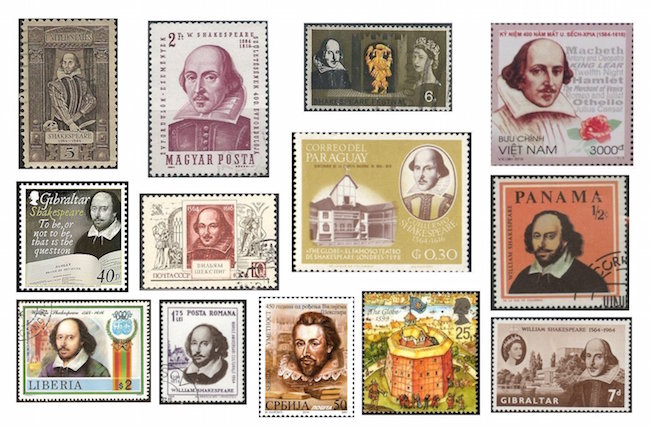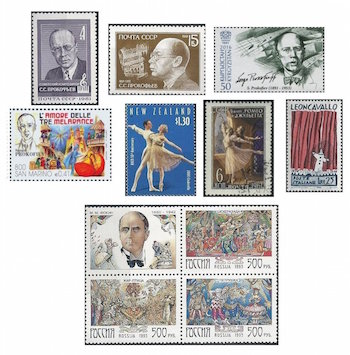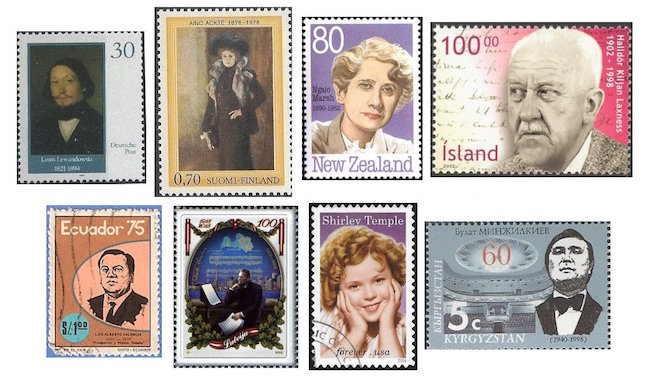The Arts on the Stamps of the World — April 23
An Arts Fuse regular feature: the arts on stamps of the world.

By Doug Briscoe
William Shakespeare died 401 years ago today (and may have been born on this date 52 years earlier). As if that weren’t enough, April 23 is also the birthday of composers Sergei Prokofiev and Ruggiero Leoncavallo (Pagliacci), Russian choreographer and dancer Mikhail Fokine, New Zealand mystery writer Ngaio Marsh, and several more people from the arts, including Shirley Temple.
I offer a small sampling of the many worldwide stamps honoring the Bard, who was baptized on April 26, 1564, but whose birthday has for a long time been celebrated on the 23rd. The United States rarely pays philatelic tribute to non-Americans (Copernicus, Luther, and Dante are some other exceptions), but in 1964 the U.S. issued a handsome stamp for the Shakespeare quatercentenary. Next to that is another of the many Shakespeare stamps issued worldwide in 1964, this one by Hungary. (The day before yesterday I saluted the actor Béni Egressy, whose brother Gábor was responsible for introducing Shakespeare into Hungary with his translations.) The musical works derived from Shakespeare’s plays and poems are, of course, legion: operas, ballets, incidental music, cantatas, concert overtures, symphonic poems, songs (some written in his own time), even piano sonatas (Beethoven’s “Tempest”). The Vietnamese (upper right) and Serbian (bottom center) issues came out just last year for the 400th anniversary of Shakespeare’s demise.
Sergei Prokofiev was born on 23 April (O.S. 15 April) 1891 and died on 5 March 1953. Unfortunately (in one sense), Stalin died on the same day, and Prokofiev’s passing was relegated to page 12. Two Soviet-era portrait stamps are here joined by a very new one (2016) from Kyrgyzstan, one from San Marino, highlighting his opera The Love for Three Oranges, and a New Zealand issue illustrating his ballet Cinderella. The oldest Prokofiev stamp, again from the USSR, comes from a set of four issued in 1961 and 1962 honoring the Russian Ballet. Most appropriately for Shakespeare Day, it cites Romeo and Juliet, arguably Prokofiev’s finest masterpiece.

Ruggiero Leoncavallo (23 April 1857 – 9 August 1919) is primarily known as the composer of Pagliacci and secondarily as the composer of the song “Mattinata”, which was written with Caruso in mind. He was also one of the five (!) librettists to collaborate on the text for Puccini’s Manon Lescaut.
One of the seminal choreographers of ballet was Mikhail Fokine (23 April [O.S. 11 April] 1880 – 22 August 1942). He entered the Saint Petersburg Imperial Ballet School when he was nine and made his debut at the Imperial Mariinsky Theatre on his eighteenth birthday. Among his many famous later creations are the choreography for the first productions (with the Ballets Russes) of Stravinsky’s Firebird and Ravel’s Daphnis and Chloe. He returned to Russia with the advent of World War I but at its end moved to Sweden, then settled in New York, and in 1924 founded the American Ballet Company. He was also devoted to painting. The Fokine block shown is a set of three stamps illustrating his work (for Scheherazade, Firebird, and Petrushka) with a label, not a stamp—note its absence of country name and denomination—offering his portrait.
German composer Louis Lewandowski (1821 – February 4, 1894) wrote mostly for the synagogue, but also composed symphonies (no source I could find tells us how many) and other works. Grove’s Dictionary calls him “perhaps the most gifted composer of Ashkenazi liturgical music in the 19th century,” and Wikipedia tells us he was the first Jew to be admitted to the Berlin Academy (at the request of Felix Mendelssohn).
Finnish soprano Aino Ackté (1876 – 8 August 1944) was at the Met in the years 1904-06 and later created the role of Salome for that opera’s Leipzig and London premières. She not only was a co-founder of what is today the Finnish National Opera, she also organized the Savonlinna Opera Festival beginning in 1912. Sibelius dedicated his tone poem Luonnotar to her.

Ngaio Marsh (1895 – 18 February 1982) was born and died in Christchurch, New Zealand, though she lived in England at various times. She studied painting and worked as an actress and, in London, as an interior decorator, but she is remembered mostly for her 32 detective novels featuring Inspector Roderick Alleyn. These were published over a span of nearly half a century between 1934 and 1982. Five of them were adapted for New Zealand television in 1977 and a further nine for the BBC in the 1990s. Marsh’s love of theater evinced itself in her direction of the Canterbury University College Drama Society, with which she produced many Shakespearean and other plays.
Thus far Halldór Kiljan Laxness is the only Icelandic person to have won a Nobel Prize. Born Halldór Guðjónsson on 23 April 1902, he wrote in many genres: 2 volumes of poetry, eight plays, about twenty novels, stories, travel, articles, memoirs. He also translated from English (Hemingway), French (Voltaire), and Danish. As quite a young man he joined an abbey in Luxembourg and converted to Catholicism. But as early as 1927 he traveled to America, where he lived for two years, and was drawn to socialism, which began to reveal itself in his writings. Like so many, he was initially an admirer of the Soviet system and later soured on it. He was awarded the Nobel Prize for Literature in 1955. Laxness died on 8 February 1998. A biography by Halldór Guðmundsson appeared in 2004 and has been translated into English.

The Ecuadorian singer and composer of popular songs Luis Alberto Valencia (1918 – 21 October 1970) was born in Quito and learned music from his father. He sang duets with a number of partners until forming a duo with Gonzalo Benítez. Together the Benítez-Valencia duo toured the USA and Mexico as well as Ecuador and Colombia. Online information about him is scarce.
Latvian composer Tālivaldis Ķeniņš (1919 – January 20, 2008) was born to prominent parents—both of them were writers, his father also a diplomat and lawyer. Ķeniņš, who had studied music and even composed from early childhood, was going to pursue a diplomatic career as well, but turned to the advanced study of music at 21. When the Soviets occupied Latvia near the end of World War II, Ķeniņš emigrated to Paris, where he was a student of Messiaen, then, in 1951, to Canada. He taught at the University of Toronto from 1952 to 1984. His works include eight symphonies, a dozen concertos for various solo instruments, chamber, and piano music, etc.
Shirley Temple (April 23, 1928 – February 10, 2014) was honored on a US stamp just last year. At the age of 11, she was painted by Salvador Dalí in a piece he wryly titled Shirley Temple, The Youngest, Most Sacred Monster of the Cinema in Her Time. Following her illustrious career as a child star (she actually didn’t retire from film until she was 22), she entered the diplomatic service and was named US Ambassador to Ghana (1974-6) by President Ford and to Czechoslovakia (1989-92) by President George H. W. Bush. There she took part in the Velvet Revolution with Václav Havel. Temple’s first husband was John Agar, who only became an actor after they were married, and her second was the wealthy businessman Charles Alden Black; that marriage lasted 54 years until his death in 2005. Herself a capable businesswoman, Shirley Temple Black died at 85 just three years ago.
Another opera singer born on April 23rd was Bulat Minzhilkiev (min-ZHEEL-k’yeff), born in 1940 in the Kirghiz Soviet Republic. He studied at the opera studio of the Kirghiz Theater, where he later became a soloist, and at La Scala. In the early 1980s he was invited by Valery Gergiev to join the Mariinsky Theatre. His notable roles included Boris Godunov, Mephistopheles in Gounod’s Faust, Basilio in Rossini’s Barber of Seville, and the Grand Inquisitor in Verdi’s Don Carlo. He appeared at the Bolshoi Theatre, La Scala, and the Met. He died on August 16, 1997, and the stamp was issued by Kazhakhstan three years later to mark the 60th anniversary of his birth.
Happy birthday to one of my heroes, Last Week Tonight’s John Oliver (born 23 April 1977).
A graduate of the University of Massachusetts with a B.A. in English, Doug Briscoe worked in Boston classical music radio, at WCRB, WGBH, and WBUR, for about 25 years, beginning in 1977. He has the curious distinction of having succeeded Robert J. Lurtsema twice, first as host of WGBH’s weekday morning classical music program in 1993, then as host of the weekend program when Robert J.’s health failed in 2000. Doug also wrote liner notes for several of the late Gunther Schuller’s GM Recordings releases as well as program notes for the Boston Classical Orchestra. For the past few years he’s been posting a Facebook “blog” of classical music on stamps of the world, which has now been expanded to encompass all the arts for The Arts Fuse.
